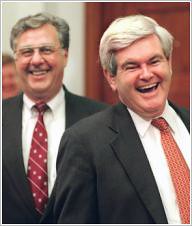
With Democrats proposing to set the top two income tax rates at 36% and 39.6% respectively, Republican leaders waged a ferocious battle on behalf of the wealthiest American taxpayers. Former House Majority Leader and current Tea Party moneyman Dick Armey warned, "This program will not give you deficit reduction." Ohio's John Kasich cautioned, "It's our bet that this is a job killer." And for his part, 2012 White House hopeful Newt Gingrich promised, "This is the Democrat machine's recession, and each one of them will be held personally accountable."
As it turns out, the year was 1993, not 2010. At issue was President Bill Clinton's $496 billion program of stimulus and upper income tax increases. And what Republicans then decried as disaster ushered in the longest economic expansion in modern American history, a period which produced 23 million new jobs and a balanced budget.
But that hasn't stopped the GOP brain trust from resurrecting their 1993 predictions of gloom and doom, forecasts which were spectacularly wrong.
Launching his campaign for House Speaker, Minority Leader John Boehner on Tuesday decried President Obama's "job-killing tax hikes" and called the expiration of the Bush tax cuts for the rich "a recipe for disaster - both for our economy and for the deficit." His Senate counterpart Mitch McConnell told Fox News, "It would be a disaster." On Meet the Press last week, Dick Armey rejected the notion of returning the tax rates for the top 2% of earners back to their Clinton-era levels, mocking Obama's "new cockamamy ideas" and insisting the President "not raise taxes and take away the return on an investment" And as Newt Gingrich predicted in July:
"This economy will sink deeper into recession. There will be higher unemployment. The recovery will be longer."
If this all sounds familiar, it should. After all, as ThinkProgress, Congress Matters and Andrew Tobias all documented, pretty much the same people said pretty much the same thing back in 1993.
If Barack Obama's experience with Republican obstructionism has been painful, Bill Clinton's was unprecedented. When Clinton's 1993 economic program scraped by without capturing the support of even one GOP lawmaker, the New York Times remarked:
Historians believe that no other important legislation, at least since World War II, has been enacted without at least one vote in either house from each major party.
Inheriting massive budget deficits and unemployment topping 7% from Bush the Elder, Clinton's $496 billion program was nonetheless opposed by every single member of the GOP, as well as defectors from his own party. As the Times recounted, it took a tie-breaking vote from Vice President Al Gore to earn victory:
An identical version of the $496 billion deficit-cutting measure was approved Thursday night by the House, 218 to 216. The Senate was divided 50 to 50 before Mr. Gore voted. Since tie votes in the House mean defeat, the bill would have failed if even one representative or one senator who voted with the President had switched sides.
(It's worth noting that while Bill Clinton met with total opposition from Republicans over his economic program, neither Ronald Reagan before him nor George W. Bush after was similarly subjected to scorched-earth politics from Democrats.)
Throughout 1993, President Clinton faced venomous - if completely baseless - charges from his Republican opponents. Newt Gingrich announced that February, "I believe that that will in fact kill the current recovery and put us back in a recession," while also warning the day before the budget vote, "This is the Democrat machine's recession, and each one of them will be held personally accountable." Bob Dole, Clinton's future reelection opponent, complained, "People out there in the real world just don't understand how record-setting tax increases and a taxpayer-financed spending spree by Congress will solve the deficit or put Americans back to work." While John Kasich (R-OH) told Clinton and the Democrats, "your economic program is a job killer," Dick Armey looked into his crystal ball to claim:
"Clearly this is a job killer in the short run. The revenues forecast for this budget will not materialize; the costs of this budget will be greater than what is forecast. The deficit will be worse, and it is not a good omen for the American economy."
Most dramatic of all was Texas Senator Phil Gramm. The same man who led the 1990's crusade to gut regulation of Wall Street and the IRS and later called America a "nation of whiners," boldly - and wrongly - predicted:
"I believe hundreds of thousands of people are going to lose their jobs...I believe Bill Clinton will be one of those people."
The Republican naysayers were, of course, wrong on every count. Bill Clinton kept his job and presided over a rapidly growing economy, expanding incomes, new stock market highs and a balanced budget. Clinton, who authored one of the best eight-year economic performances of the modern presidents, bequeathed a CBO-estimated $5.6 trillion surplus to his successor, the man with the worst economic record. Alas, with his tax cut windfall for the wealthy, George W. Bush squandered it and derailed the American economy.
Of course, Barack Obama is not Bill Clinton. And to be sure, the current Bush recession and red ink are far more severe than that produced by his father. But for Republicans protesting a return to the same upper class income tax rates in place during the years of the Clinton boom, the gloomy rhetoric and its mouthpieces are almost unchanged. Put another way, the copy-and-paste GOP approach to the tax proposals of Barack Obama is just the same s**t, different day.
(This piece also appears at Perrspectives.)















